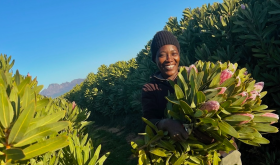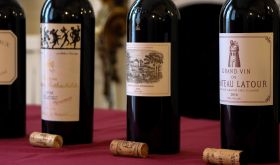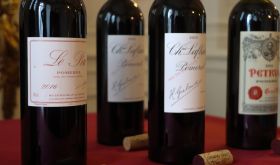No guide book or any of my friend's reports fully alerted me to the magnificent colours, intense smells or vibrant freshness of the food along the streets of Delhi. Or of the ubiquity of the dhabas – as these street side restaurants are called, many of which revel in such unassuming names as The Glory, The National or The Chick-Inn – which jostle cheek by jowl to feed India's teeming population.
So strong in fact are these images that my three most memorable gastronomic impressions of an all too short week in India did not even involve tasting or eating food but merely looking at it.
The first, and most painful, came after an hour's walk through the narrow, medieval lanes of Old Delhi. Up a dark, steep set of stairs to a balcony occupied by pavement barbers, tailors and a woman sieving fennel seeds, is the wholesale centre of the capital's dried red chilli market. As I walked amongst the young men sewing up 20 kg canvas bags of this dynamite food stuff for consignment to hotels and restaurants I was overcome initially by coughing, then by a runny nose and finally by tears, forcing an abrupt retreat to the sound of laughter from the real men.
The kitchen within the city's main Sikh temple is an altogether more peaceful experience. Better off Sikhs are encouraged to donate food to feed the less fortunate and in addition many work voluntarily to prepare this food. Jobs are seemingly designated by sex and generation. Young men knead the chapatis which older women roll out. Younger women then take them to a broad, central griddle where they are cooked and flipped by teenagers before being carried off to hungry mouths. Behind them all, a middle aged man supervises four large gas burners on which the vegetables are cooking.
My highest professional respect was however reserved for the fish filleters in the vast INA market (once the location of India National Airlines) where you can buy everything from the Weetabix my ex-patriot friend was in search of to any of the country's spices in domestic quantities – and marvel at this piscatorial dexterity. The filleters sit cross legged and barefoot behind huge piles of fish on ice with a huge crescent shaped blade in front of them on which they descale and cut the fish to your specification – seemingly and miraculously without causing themselves any permanent damage.
All these ingredients created such a strong impression partly because of their colour but also because they were forbidden fruit. For any short stay traveller, on business or pleasure, the quickest way to minimising your India experience is to eat the street food until and unless your stomach is suitably inured. The villain is not, as in the West, a lack of freshness or undercooking but rather the water in which the fruit, vegetables and cooking utensils are washed at stand pipes along the streets.
This risk is significantly reduced in the restaurants of the top Indian hotels where the chefs wear rubber gloves and the fruit, vegetables and salad leaves reach your table via a Milton sanitizing bath. As Jim Tawa, the New Zealand executive chef of the recently opened Amarvilas hotel overlooking the Taj Mahal in Agra told me, he takes only the best third of every batch of fruit delivered that morning to the kitchen door and then they wash everything before it is refrigerated.
The downside is that to reach the gastronomic safety of these restaurants you may have to walk through an unnecessarily loud and garish hotel lobby, with the worst offender being possibly the Maurya Sheraton which even boasts a banner by the entrance to its justifiably renowned Dum Pukht restaurant of its eleven best selling dishes.
But it is worth perservering. Some of Dum Pukht's Kashmiri dishes are worth the trek through a lobby still redolent of the Clinton visit last year, particularly if you can make it as part of a group of six or more that can share in this distinctive style of cooking whereby ingredients are slow cooked under a thin pastry case which is broken open on your table. Raan-e-dumpukht, leg of mutton, marinated in dark rum, stuffed with onions, cheese and mint and dum trout, where the fish is cooked in pomegranate juice, were the best examples of this style of cooking but the baghare baigan, small whole aubergines cooked with sesame seeds and peanuts and the restaurant's bright yellow dal with yoghurt and burnt garlic are two excellent vegetarian options.
By contrast the Maidens Hotel, built 100 years ago, offers a far more tranquil approach to eating in an hotel. The setting is definitely old India: the room is named after former Viceroy Lord Curzon; polo players, elephants and processions feature predominantly in the sepia tinted photos and the high ceiling obviously pre-dates air conditioning – but the food on the lunch buffet is right up to date. Best of all were three curries: mutton; a much spicier Goan fish recipe, and one using kadhi pakera, a vegetable similar to a pumpkin that had been expertly cooked so as to retain its full flavour and texture.
Returning to London in the grip of yet more angst over meat merely reemphasised how much pleasure and excitement Indian vegetarian cooking can give. Had anyone told me that one of my best meals for some time would incorporate three dishes whose sole ingredient at each course were the potato, the cauliflower and half a dozen mushrooms I would have laughed – but now I would relish the chance to eat tandoori phool, bharwaan batata and bhairwaan gucchi on a weekly basis.
Alongside Tawa in the kitchen in Agra is a 26 year old Indian chef of great promise who cores potatoes with spices, sultanas and cashew nuts before cooking them in a tandoor oven and impregnates the florets of a quartered cauliflower with diced vegetables and dried fruits before marinating it overnight to produce remarkable flavours from this much maligned vegetable. But best of all are his stuffed Kashmiri morels, poached in a saffron scented yoghurt gravy thickened with mace. Twenty five years ago Shirley Conran famously stated that life was too short to stuff a mushroom but it is a reflection of the charms of India today, and of its many talented chefs, that this maxim is not yet universally applicable.
Amarvilas, Agra, tel 91-562-23 1515
Maidens Hotel, Delhi, tel 91.11.397 5464
Maurya Sheraton, Delhi, tel 61-122233













